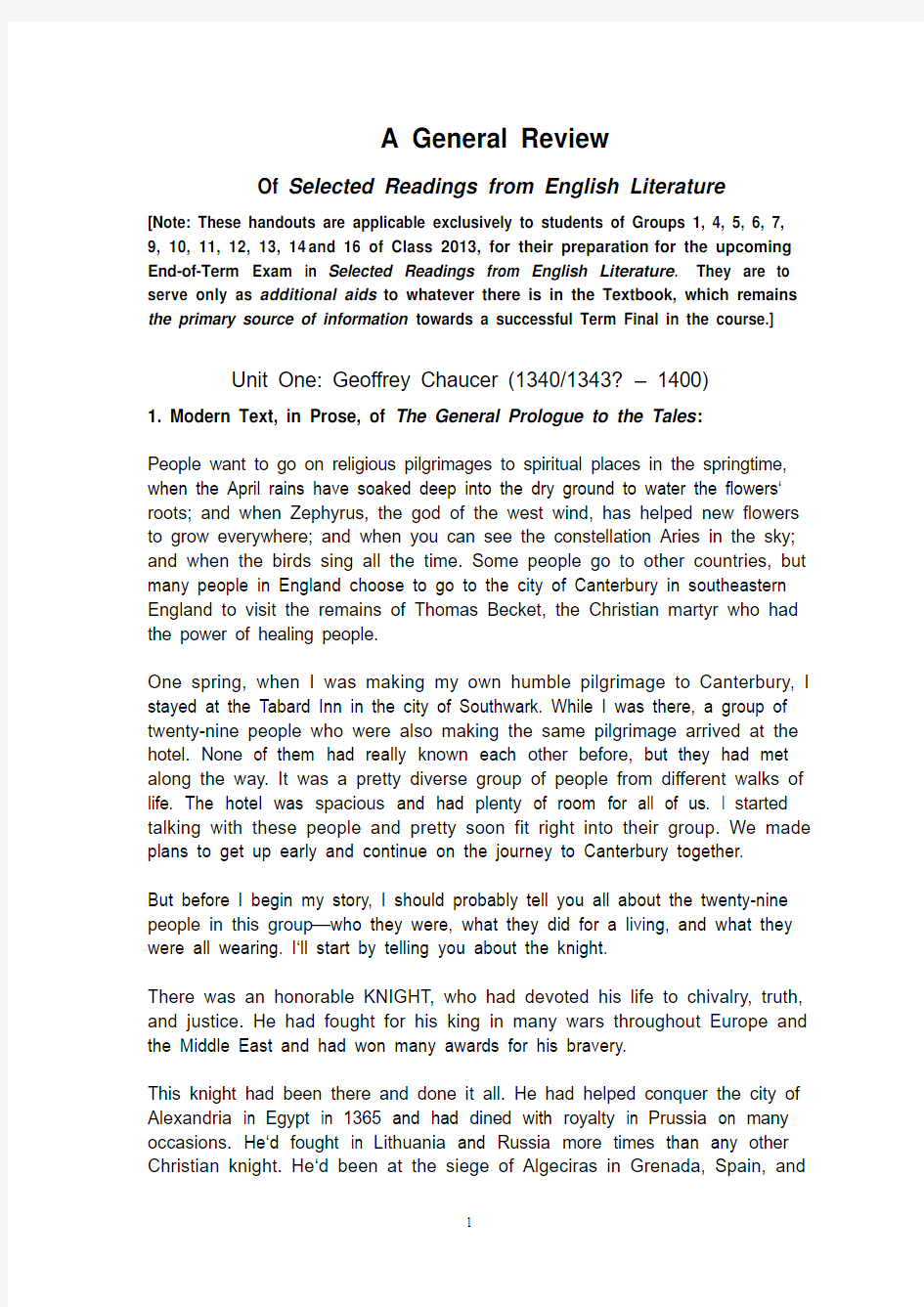期末:英文选总复习材料

- 1、下载文档前请自行甄别文档内容的完整性,平台不提供额外的编辑、内容补充、找答案等附加服务。
- 2、"仅部分预览"的文档,不可在线预览部分如存在完整性等问题,可反馈申请退款(可完整预览的文档不适用该条件!)。
- 3、如文档侵犯您的权益,请联系客服反馈,我们会尽快为您处理(人工客服工作时间:9:00-18:30)。
A General Review
Of Selected Readings from English Literature
[Note: These handouts are applicable exclusively to students of Groups 1, 4, 5, 6, 7, 9, 10, 11, 12, 13, 14 and 16 of Class 2013, for their preparation for the upcoming End-of-Term Exam in Selected Readings from English Literature. They are to serve only as additional aids to whatever there is in the Textbook, which remains the primary source of information towards a successful Term Final in the course.]
Unit One: Geoffrey Chaucer (1340/1343? – 1400)
1. Modern Text, in Prose, of The General Prologue to the Tales:
People want to go on religious pilgrimages to spiritual places in the springtime, when the April rains have soaked deep into the dry ground to water the flowers‘ roots; and when Zephyrus, the god of the west wind, has helped new flowers to grow everywhere; and when you can see the constellation Aries in the sky; and when the birds sing all the time. Some people go to other countries, but many people in England choose to go to the city of Canterbury in southeastern England to visit the remains of Thomas Becket, the Christian martyr who had the power of healing people.
One spring, when I was making my own humble pilgrimage to Canterbury, I stayed at the Tabard Inn in the city of Southwark. While I was there, a group of twenty-nine people who were also making the same pilgrimage arrived at the hotel. None of them had really known each other before, but they had met along the way. It was a pretty diverse group of people from different walks of life. The hotel was spacious and had plenty of room for all of us. I started talking with these people and pretty soon fit right into their group. We made plans to get up early and continue on the journey to Canterbury together.
But before I begin my story, I should probably tell you all about the twenty-nine people in this group—who they were, what they did for a living, and what they were all wearing. I‘ll start by telling you about the knight.
There was an honorable KNIGHT, who had devoted his life to chivalry, truth, and justice. He had fought for his king in many wars throughout Europe and the Middle East and had won many awards for his bravery.
This knight had been there and done it all. He had helped conquer the city of Alexandria in Egypt in 1365 and had dined with royalty in Prussia on many occasions. He‘d fought in Lithuania and Russia more times than any other Christian knight. He‘d been at the siege of Algeciras in Grenada, Spain, and
had conquered enemies in North Africa and Eastern Europe. He‘d been all over the Mediterranean Sea. He‘d been in fifteen battles—three of them against the heathens of Algeria—and he‘d never lost once. This knight had even fought with the pagan king of Istanbul in Turkey against another non-Christian. Despite his huge success and his noble lineage, he was practical, self-disciplined, and humble. Never had he said anything bad about another person. He truly was the most perfect knight in every way possible. Now, to tell you about his clothes. He rode fine quality horses, but he didn‘t wear flashy clothes. He wore a simple cotton shirt that had stains all over it from the chain mail he‘d worn in the war he‘d won just before starting out on the pilgrimage to Canterbury.
2. Things to Remember:
1)Geoffrey Chaucer and John Milton are regarded by many as the most
accomplished authors after Shakespeare;
2) The reasons for Chaucer’s popularity are two-fold:
a. Firstly, he is a truly magnificent poet;
b. Secondly, he is the first truly great English author to write in his own
language, rather than French or Latin.
3) The original plan for The Canterbury Tales was huge and ambitious.
Twenty-nine pilgrims meet in London to embark on a pilgrimage to the shrine of St. Thomas a Becket in Canterbury. Organized by the Host or landlord of the inn where they meet, each pilgrim is to tell four tales on the pilgrimage to help pass the time, with a dinner paid for by the others at the Host‘s inn (the Host is no fool!) for the best storyteller and story. Chaucer never completed the whole plan, and only twenty-four tales have come down to us, with four of these incomplete one way or another.
4) Chaucer is difficult to read because his Middle English is very different
from modern English: vocabulary, syntax, construction, and pronunciation have all changed since the fourteenth century.
5) Old English: the English language up to c.1150.
Middle English: the English language from c.1150 to 1500.
Modern English: the English language from about 1500 onwards.
3. About Geoffrey Chaucer:
Chaucer was the son of a prosperous businessman who became a member of the King‘s Court. Chaucer‘s life was typical of his class (non-landowning, living static lives of poverty and degradation). He was a courtier, well-versed in the tremendously complex etiquette and manners of court life. He was a soldier, being captured at one time by the French and ransomed by the King for £16.00, and a diplomat. He was a Civil Servant, holding a post such as Controller of Customs in London. He
